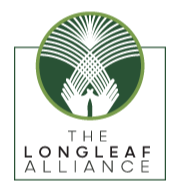News
News articles and events on WLFW, Landscapes and Wildlife sites.
Register and submit abstracts for the 2025 SE Drought and Aquatic Ecosystems Workshop
January 7-9, 2025
NOAAFireBird Sept 2023 – Feb 2024 Newsletter
Check out the newest issue of our newsletter!
SE FireMap at The Longleaf Alliance Conference
Come say hello to the SE FireMap team at the Biennial Longleaf Conference October 8th-11th, 2024!
Science Seminar Sept 17: New Project Lightning Talks
Researcher + partner pairs talk about their newly funded projects for FY24.
Conservation Corridor Newsletter September 2024
Connecting science to conservation.
News from SECAS August 2024 Newsletter
SECAS August newsletter: Updated map features SECAS success stories, register for a Blueprint workshop, Amanda says farewell, and more
Southeast Climate Adaptation Science Center Event - Partnering with Fire: Learning from Tribal Nations and Indigenous Practices
Join the South Central Climate Adaptation Science Center, the Southeast Climate Adaptation Science Center, and the U.S. Forest Service for our upcoming virtual workshop “Partnering with Fire: Learning from Tribal Nations and Indigenous Practices.”
WLFW West Newsletter August 2024
Publication Alert: Grazing and Grazers Support Pollinators’ Critical Role in Ecology
WLFW West Newsletter July 2024
Invasive Annual Grasses Resources | NRCS Helps Ranchers
News from SECAS July 2024 Newsletter
Save the date for Oct-Nov Blueprint workshops, SECAS helps with Wildlife Action Plans, the value of Sentinel Landscapes.
Myth Busters: Learn the Facts about the Emergency Forest Restoration Program
The Emergency Forest Restoration Program (EFRP) provides technical and financial assistance to owners of nonindustrial private forestland whose forestland was damaged by a qualifying natural disaster event.
New Songbird Habitat Study Unlocks Benefits for the Monarch Butterfly
A new study reveals that managing habitat for songbirds like the golden-winged warbler also benefits insect pollinators like the at-risk monarch butterfly.
National Association of State Foresters Weekly Newsletter June 21, 2024
NASF Weekly Newsletter
Conservation Corridor June 2024 Newsletter
Connectivity Science; Connectivity Management; Connectivity & Climate Change; Connectivity Policy; Connectivity News; Previous Digests.
WLFW East Region Conservation Series May 9, 2024
Tune in Thursday, May 9th, at 11:30 am CST (12:30 PM EST) for our first webinar in the new mini-series, “Programs and Partnerships”! This week's topic will cover "What is Working Lands for Wildlife?" with speakers Bridgett Costanzo with USDA and Dr. Jess McGuire with Quail Forever.
WLFW West Newsletter April 2024
A Wyoming Cheatgrass Success Story | New Sagebrush Songbird and Pronghorn Science
Prescribed Fire for Forest Management Webinar Series
Foresters and land managers have many management tools at their disposal. A tool that’s often overlooked is prescribed fire. Prescribed fire for forest management is important for ecosystem health, forest regeneration, wildlife habitat, forest health, and disease control. Join us for insightful discussions with national experts as we discuss forest management using prescribed fire. Learn some of the practical knowledge of where, when, why, and how to apply fire in forest ecosystems.
NASF Weekly Newsletter April 12, 2024
The NASF Washington Weekly Report is an e-newsletter that is distributed via email every Friday afternoon. The newsletter is a digest of the NASF Blog and contains brief items of interest to NASF constituents, including media coverage of congressional activities, forestry-related science and technology, and upcoming events.
WLFW East Region Conservation Series April 11 2024
Tune in Thursday, April 11th, at 11:30 am CST (12:30 PM EST) for our last webinar in the Pollinator Series! This week's topic will cover "Maintaining Pollinator Habitat" with speaker Brittney Viers with Quail Forever.
DOI Nature-based Solutions Roadmap
The purpose of the Department of the Interior Nature Based Solutions Roadmap is to provide Department of the Interior (DOI) staff with consistent and credible information about nature-based solutions, such as which strategies match certain conditions and goals, what co-benefits they are likely to provide, example projects, and additional resources for project planning, construction, and monitoring.


























